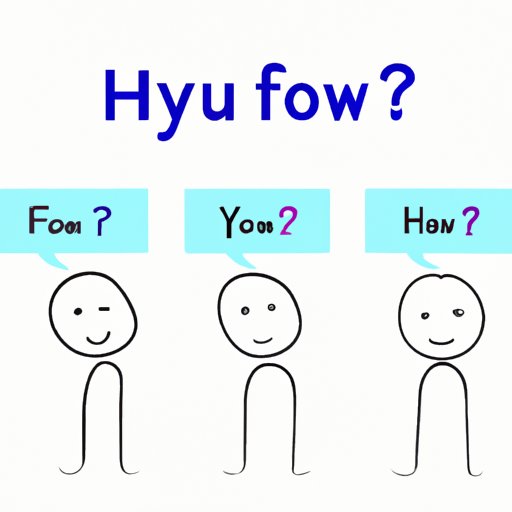
Introduction
As one of the most romantic and popular languages in the world, French is widely spoken by millions of people worldwide. From a traveler to a language learner, it is important to know the different ways to ask “How are you?” in French. In this guide, we will explore different expressions commonly used by French speakers to inquire about one’s well-being.
“Bonjour! Comment ça va?”
The most traditional and common French expression for asking “How are you?” is “Bonjour! Comment ça va?” which translates to “Good day! How’s it going?”
Breaking down the individual words, “bonjour” means “good day,” “comment” means “how,” “ça” means “it,” and “va” means “is going” or “going.”
When using this expression, it is important to note that the pronunciation and intonation are crucial. The French language has many liaisons and enunciations that can greatly affect the meaning and delivery of the phrase.
“Comment tu vas?”
A more casual way to ask “How are you?” in French is “Comment tu vas?” which directly translates to “How are you doing?” This expression is often used between friends or acquaintances.
Compared to “Bonjour! Comment ça va?” this expression is more informal and friendly. However, it is important to note that the degree of formality depends on the relationship between the people speaking.
“Ça roule?”
“Ça roule?” is a French idiomatic expression that can be translated to “Is everything rolling?” or “Is everything going well?”
Although there is no direct translation for this expression, it is commonly used by French speakers to ask how someone is doing or if everything is going smoothly. It is a more informal way of asking “How are you?” and is often used among friends.
Examples:
- Tu vas bien? – Are you doing well?
- Oui, ça roule – Yes, everything is going smoothly.
“Tu as la pêche today?”
“Tu as la pêche today?” is another common French expression used to inquire about one’s well-being. However, unlike the other expressions mentioned, this one is metaphorical and literally means “Do you have the peach today?”
In French, “avoir la pêche” means to be in great shape or have a lot of energy. This expression is often used to ask if someone is feeling good or in high spirits.
Example:
- Tu as la pêche aujourd’hui? – Are you feeling good today?
- Oui, j’ai la pêche! – Yes, I’m feeling great!
“Quoi de neuf?”
Another idiomatic expression commonly used by French speakers to ask “How are you?” is “Quoi de neuf?” which translates to “What’s new?” This expression is often used more casually and is suitable for friends who want to catch up on each other’s lives.
“Comment allez-vous?”
“Comment allez-vous?” is the more formal and polite way to ask “How are you?” in French. This expression is often used in professional or formal settings.
The literal translation of this phrase is “How are you doing?” and it is a more polite and formal version of “Comment tu vas?”
Example:
- Bonjour, comment allez-vous aujourd’hui? – Good morning, how are you doing today?
- Je vais bien, merci. Et vous? – I’m doing well, thank you. And you?
“Tu te sens comment?”
“Tu te sens comment?” is a French expression focused on the emotional well-being of the person being asked. It directly translates to “How are you feeling?”
This expression is often used to ask someone how they are feeling after a difficult situation or ask if they are okay emotionally. It is a more personal and caring way of asking “How are you?”
Example:
- Tu te sens comment après la rupture? – How are you feeling after the breakup?
- Je ne vais pas très bien. – I’m not doing very well.
Conclusion
As shown in this guide, there are various ways to ask “How are you?” in French depending on the situation and relationship between the people conversing. It is important to learn and practice these different expressions to better communicate and connect with French speakers. Whether you are traveling or learning the language, knowing how to greet someone properly is essential.
Remember to consider the tone, formality, and context when using each of these expressions.




